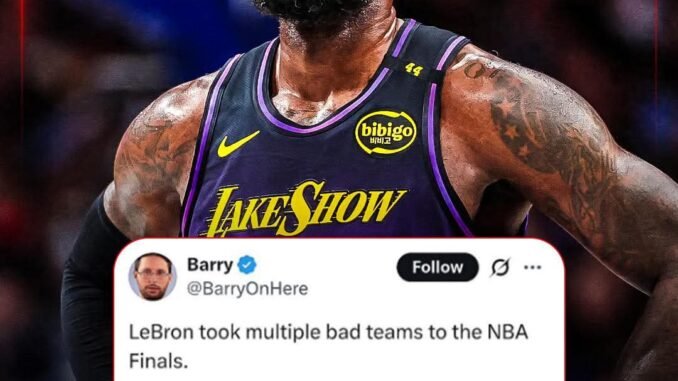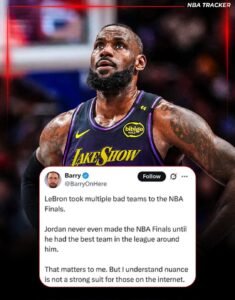
A viral tweet reignites the conversation around how much weight team quality should hold in comparing LeBron James and Michael Jordan’s playoff legacies.
The NBA GOAT debate never sleeps. And once again, social media has stirred the pot with a fresh take — or rather, a pointed reminder.
In a recent tweet that went viral, user @BarryOnHere stated:
“LeBron took multiple bad teams to the NBA Finals.
Jordan never even made the NBA Finals until he had the best team in the league around him.
That matters to me. But I understand nuance is not a strong suit for those on the internet.”
This comment struck a chord with basketball fans — and reopened one of the most debated chapters in NBA discourse: how much does team context matter when comparing greatness, especially between LeBron James and Michael Jordan?
Let’s break it down.
LeBron James: The Lone Carrier
From the moment he entered the NBA in 2003, LeBron James has been burdened with expectations — and, often, with rosters that didn’t match his talent. While he’s had superstar teammates at various stages of his career (Wade, Bosh, Kyrie, AD), some of LeBron’s most impressive playoff runs came when he didn’t.
The 2007 Cavaliers team he dragged to the NBA Finals? It had no other All-Stars. The second-best player was Larry Hughes. They got swept by the San Antonio Spurs, yes, but the fact that they were even there is considered a monumental achievement.
Fast forward to 2018. LeBron, at age 33, carried another talent-deprived Cavaliers team back to the Finals after dismantling the Raptors and Celtics. Again, no true second star. Just LeBron’s brilliance — averaging 34 points, 9 rebounds, and 9 assists per game in that postseason — and sheer willpower.
These aren’t just Finals appearances. They’re Herculean efforts that speak to LeBron’s all-around game, endurance, and leadership. They’ve helped define his legacy — not by titles won, but by improbable journeys.

Michael Jordan: The Dynasty Years
Let’s make something clear: Michael Jordan is arguably the most iconic player in basketball history. Six championships, six Finals MVPs, a perfect Finals record. He is a relentless competitor who reshaped the global image of basketball.
But before the Bulls’ dynasty took flight in 1991, Jordan endured years of playoff frustration — often at the hands of the Celtics and Pistons. It wasn’t until Scottie Pippen emerged as an All-NBA-caliber running mate and Phil Jackson’s triangle offense was fully implemented that Jordan ascended to the top.
Jordan’s first Finals appearance came in his seventh season. By then, the Bulls had matured into a juggernaut. They won 61 games that year. They were the best team in the league — not just because of Jordan’s brilliance, but because the system and supporting cast were finally elite.
Does this diminish his greatness? Of course not. But it raises a valid point: Jordan needed a dominant team around him to reach and dominate in the Finals. LeBron, by contrast, reached that stage multiple times with significantly less.
Why Context and Nuance Matter
This is where nuance — as Barry suggests — is crucial. Comparing legacies in a vacuum rarely yields fairness. Jordan’s Finals record (6–0) is legendary, but does that inherently outweigh LeBron’s 4–6 if four of those losses came against dynastic teams like the Spurs and Warriors?
Moreover, LeBron’s Finals appearances span three decades, four different rosters, and an ever-changing NBA landscape. He’s faced teams with 73–9 records (Warriors, 2016), peak Tim Duncan Spurs squads, and had to adapt through eras — from big-man dominance to three-point revolutions.
Jordan played 15 seasons, with 13 full years (excluding his brief 1995 return and two-year Wizards stint). LeBron is entering year 22. The volume of work alone invites a different conversation.
One player had sustained excellence. The other had perfect Finals efficiency — but with a smaller sample size and fewer seasons of wear and tear.
What This Means for the GOAT Debate
If the argument is about peaks, Jordan’s dominance is hard to argue against. But if the argument is about overall career value, impact, and versatility across eras, LeBron’s case gets stronger — especially when considering the caliber of teams he led deep into the postseason.
Think about it this way:
-
Jordan was the best player on the best team and did exactly what he was supposed to do — win.
-
LeBron was often the best player on inferior teams… and still won, or at least got to the dance.
It’s like comparing a sprinter who wins six golds in perfect conditions, to a marathon runner who finishes top-three every time — even when the course is uphill and the weather is brutal.
Final Thoughts: The Right Takeaway
Instead of using Finals records as the sole metric — a flawed and overly simplistic standard — maybe the focus should shift toward impact, difficulty, and context.
LeBron didn’t just play in the Finals — he altered the league just by being there. He toppled dynasties, created superteams to match firepower, and remained competitive through eras where many would have faded.
Jordan perfected dominance in an optimized system. LeBron perfected adaptation in a volatile league.
Both are legends. Both changed basketball. But maybe, just maybe, the conversation should allow for two truths at once:
Jordan was the perfect closer. LeBron is the ultimate survivor.
And greatness, in all its forms, deserves more than one definition.
What do you think — does taking “bad teams” to the Finals strengthen LeBron’s case? Or does Jordan’s perfection outweigh the grind?
#LeBronJames #MichaelJordan #GOATDebate #NBAFinals #LegacyTalk #ContextMatters
Leave a Reply